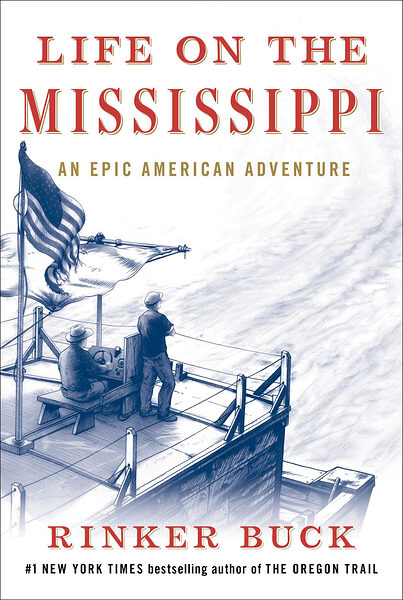Looking for a good read? Here is a recommendation. I have an unusual approach to reviewing books. I review books I feel merit a review. Each review is an opportunity to recommend a book. If I do not think a book is worth reading, I find another book to review. You do not have to agree with everything every author has written (I do not), but the fiction I review is entertaining (and often thought-provoking) and the non-fiction contain ideas worth reading.
Book Review
History, Adventure, and Introspection
Reviewed by Mark Lardas
February 26, 2023
“Life on the Mississippi: An Epic American Adventure,” by Rinker Buck, Avid Reader Press, 2022, 416 pages, $32.50 (Hardcover), $19.99 (paperback), $13.99 (ebook)
Rinker Buck is a newspaperman. His hobby is visiting the past. But since he lacks a time machine, he tries to relive past eras in the present.
“Life on the Mississippi: An Epic American Adventure” by Rinker Buck documents his latest adventure. This time, he travels by flatboat down the Monongahela, Ohio, and Mississippi rivers to New Orleans. Along the way, he learns about America in the late 18th, early 19th, and early 21st centuries.
Rivermen rafted the route from the 1780s through the beginning of the Civil War. Although the steamboat began supplanting flatboats in the 1830s, flatboats remained important through the 1850s. Buck shows that settlers traveling trans-Appalachian America east of the Mississippi did not rely solely on Conestoga wagons. Settlers used flatboats to move west and built homes along the rivers and creeks of the Mississippi River basin.
In 1782, Jacob Yoder launched his flatboat from the banks of Monongahela, upstream of Pittsburgh, loaded with the harvest from his farm to sell in New Orleans. It proved so profitable that others imitated him, creating an industry and a culture.
Buck explores this experience. He has a flatboat built and then follows the route of the first flatboat trip to New Orleans. Buck’s boat, while not a faithful copy, is close enough. It has an engine and 21st-century technology; rivers are too crowded now to be navigated otherwise. Its crew is an eccentric collection close in spirit to the original river rats. Some work out well. Others prove problematic.
Buck is frequently warned of the dangers of the voyage. He describes the warnings given to his crew before and during their adventure in grisly detail, marked by the words: “You are all going to die.” These warnings prove overstated, yet the voyage is not for the faint-hearted. Three crew members break bones. Yet, it all proves worth the price. Buck makes friends along the way, sees parts of the country overlooked by many, and learns that the past and present form a seamless whole.
“Life on the Mississippi” is a fascinating mix of history and travelogue. Buck pays homage to Mark Twain’s “Life on the Mississippi” and Harland Hubbard’s “Shantyboat” (documenting a similar voyage in the 1940s). His adventures are his own, though. He shines a light on an important yet forgotten part of American history and shows its relevance to today’s America.
Mark Lardas, an engineer, freelance writer, historian, and model-maker, lives in League City, TX. His website is marklardas.com. This review appeared in a different form in American Essence magazine and Epoch Times.
